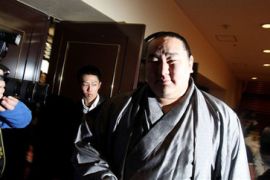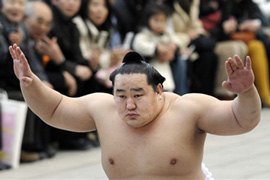Asashoryu bids a tearful farewell
Japan’s sumo grand champion retires after allegations of assault.

 |
| A tearful Asashoryu announces his retirement in the wake of allegations [AFP] |
Controversial sumo grand champion Asashoryu has retired from Japan’s revered sport following allegations of a drunken assault in Tokyo last month.
The Mongolian wrestler has been involved in a series of incidents over the years that have tainted the reputation of Japan’s ancient sport, but in the most recent the 29-year-old was accused of hitting a man and breaking his nose in a bar in downtown Tokyo.
The incident came in the middle of the New Year sumo tournament and has
dominated headlines in Japan ever since.
At a press conference, a tearful Asashoryu announced his immediate retirement.
“I will retire,” he said after meeting with sumo officials.
“I have caused great trouble to everyone, as well as to the Japan Sumo Association,” he said, dabbing his eyes at times.
“I am taking responsibility and retiring today … I am grateful for all those who believed in me and supported a young boy from the great plains of Mongolia.”
Popular figure
Asashoryu has often been in hot water outside the sumo ring but is beloved by fans for his exploits in it. Japanese broadcasters flashed new bulletins with his plans to retire, later telecasting his farewell announcement.
Asashoryu, born Dolgorsuren Dagvadorj, had won his 25th Emperor’s Cup last month, and is third on the all-time list of title winners. but sumo officials took a dim view of his latest apparent breach of discipline.
The head of Asashoryu’s sumo stable told Japanese media at the weekend that the Mongolian grand champion had been too drunk to remember the reported incident outside a nightclub in the early hours of January 16.
Asashoryu has frequently been at odds with the sport’s hierarchy during an explosive career, for everything from pulling an opponent’s hair to starting a soapy bathroom brawl during a post-bout soak.
In 2007, Asashoryu was suspended after being caught playing football in Mongolia and forging a doctor’s note for an apparent back injury.
That suspension triggered a bout of clinical depression, leading Asashoryu to seek solace at a luxury spa resort in his native country.
Commitment
Asashoryu, often criticised by domestic media for not showing “hinkaku” – dignity – as grand champion, said on Thursday his style in the ring showed his real commitment.
“Everybody talks about dignity, but when I went into the ring, I felt fierce like a devil.”
Asashoryu said his best memory in sumo was beating grand champion Musashimaru when his parents made their first trip to Japan to see him wrestle.
“That was my best moment,” Asashoryu said, wiping away tears.
“I’ve been under a lot of mental stress and right now I want to get some rest.”
Assault
Newly elected Japan Sumo Association (JSA) executive board member Takanohana on Tuesday ordered an investigation following reports Asashoryu had broken a man’s nose.
Senior JSA figures had said Asashoryu would face punishment if the reports were proven.
 |
| Asashoryu is a popular figure in the sport, despite a controversial past [AFP] |
His retirement leaves the traditional sport, with origins dating to the mythological founding of Japan, with only one yokozuna – fellow Mongolian Hakuho.
In recent years sumo has attracted many foreign wrestlers, while most young Japanese have shunned the sport’s harsh lifestyle, exhausting training and rigid society.
Asashoryu, long rumoured to be considering leaving the sport, called the timing of his farewell fate.
“I think this is my destiny,” he said.
Regardless of his antics outside of the ring, Asashoryu will be remembered as one of the greatest grand champions in the history of sumo. Only two wrestlers – Taiho with 32 and Chiyonofuji with 31 – have more titles than Asashoryu.